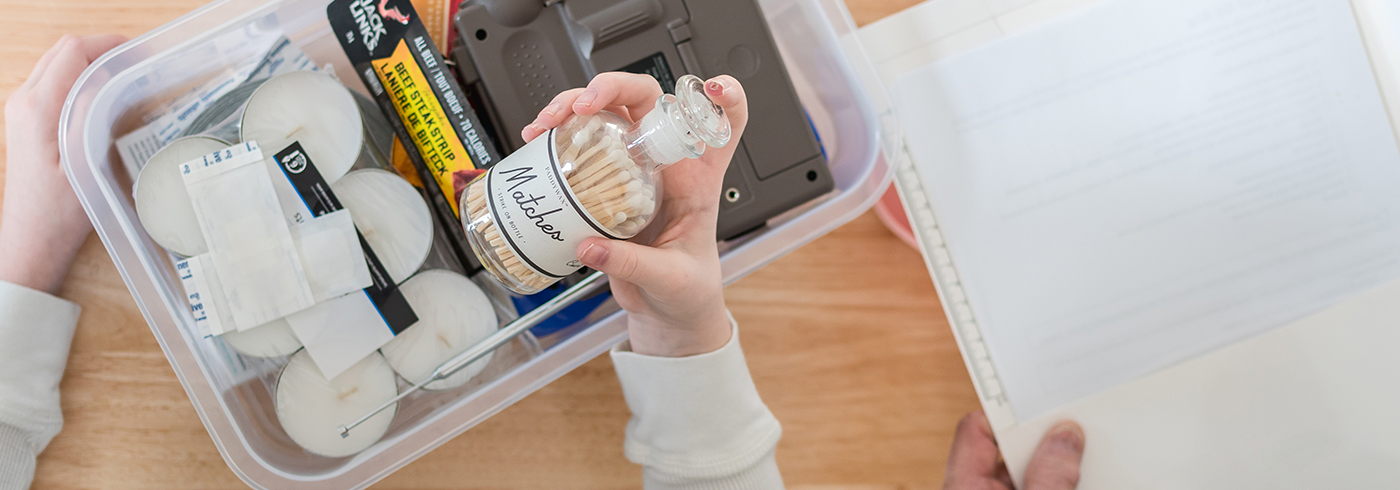
Emergency Preparedness
Emergencies can happen quickly, without warning, at any time of day and in any season. Emergency preparedness starts at home. Make sure you and your family are prepared for any emergency.
If you live, work, play, or go to school near the nuclear plants in Clarington or Pickering, take some time to learn about how you can prepare to be safe.
The Region of Durham and its eight local area municipalities have emergency programs and plans in place. Plans are regularly reviewed and practised.
| Emergency kits | ||||||
|
Here in Durham, we are no stranger to ice storms and blackouts. You should make sure that your home is equipped with the supplies you’ll need if the power is out and you’re stuck at home for a few days. Your prepared home should have:
Carbon Monoxide causes accidental poisonings and deaths in Ontario every year. Stay safe during power outages. Do not bring generators or barbeques inside your home or garage. Ensure that your home has working carbon monoxide detectors with batteries to prevent carbon monoxide poisoning when the power is off.
|
||||||
|
Emergency plans |
||||||
|
If you are asked to stay inside or evacuate, you should have an emergency plan. Take some time to write down what you are going to do in an emergency. Include children, seniors, and pets in your plan. For anyone with disabilities or special needs, the federal and provincial governments also offer guides for your emergency planning. Think about things like:
Make sure everyone knows where to find your emergency plan and emergency kits. Remember to practice your plan often. Read the Durham Region Emergency Master Plan, the Durham Nuclear Emergency Response Plan and Durham's Hazard Identification and Risk Assessment. |
||||||
|
Emergency Evacuation Centres |
||||||
|
During an emergency, you may be asked to evacuate. It is always a good idea to have an emergency plan. You should also have emergency kits ready in case of an emergency. Your emergency plan should include a safe place to go. If you aren't able to get to that safe place, you may have to go to an evacuation centre. In collaboration with a range of community partners, evacuation centres are set up in a safe place provided by the municipality. At an evacuation centre, you will have access to emergency social services such as:
You can take your pet to an evacuation centre with you. Make sure you make plans for them too when you are getting your plan and your kits ready. |
||||||
|
Stay in touch |
||||||
|
Radio, television, reliable websites, and official social media channels are the best places to get information during an emergency. Use a battery-powered or crank radio if the power is out and cell networks are down. Follow official Twitter accounts now to stay informed during an emergency: Connect through your existing networks Call your family and friends during an emergency. Make sure to update your phone list often and organize your emergency phone contacts in the Stay in Touch Checklist. Your neighbourhood networks are important, too. Think about the connections you already have: your sports teams, spiritual groups, and friends in the neighbourhood. These may be a key source of support. Update your social media status Facebook allows you to mark yourself safe in an emergency. Update your status on your other social media accounts to let friends and family know you're okay. Remember, if you need help right away because of an injury or immediate danger, call 9-1-1.
|
At The Ready guide
Preparing for emergencies doesn’t have to feel overwhelming. The free At The Ready guide has been condensed down to the most important things you can do to make your family ready for an emergency:
- A simple template to write your family meetup plan (just fill in the blanks).
- Checklists of the emergency supplies you need.
- Emergency advice that’s made for Durham Region and your busy life.
- The Region’s favourite tips and tricks.

Community resources and municipal partners
|
Municipalities |
|
Nuclear preparedness |
|
Personal preparedness |
|
Severe weather |
|
Contact Us




